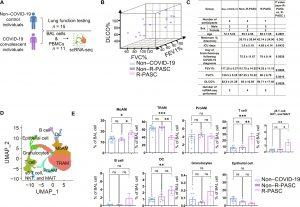A new study has uncovered a potential root cause of respiratory symptoms in long COVID and a promising avenue for treatment (Figure 1). Researchers have discovered that COVID-19 infection can trigger persistent inflammation in lung tissue, leading to long-term respiratory issues.

Figure 1: Lung function status and BAL cell type components are altered in R-PASC. (A) Experimental workflow: Lung function parameters were tested on non–COVID-19 or COVID-19 convalescent individuals (N = 15), and scRNA-seq was performed on PBMCs and BAL cells from donors (N = 11). (B) Three-dimensional distributions of lung function. (C) Summary of donor’s clinical data during the acute phase and lung function results during sampling at the indicated day after COVID-19 diagnosis. (D) Uniform Manifold Approximation and Projection (UMAP) plot showing integrated BAL cells. (E) Bar graphs showing the proportion of indicated cell types in BAL cells among each group. MoAM, monocyte-derived alveolar macrophage; TRAM, tissue-resident macrophage; ProAM, proliferating alveolar macrophage. Data are represented by means ± SEM or individual samples. Significance was tested by t test (C) or one-way ANOVA with Tukey’s adjustment (E); ns, not significant; *P < 0.05, **P < 0.01, and ***P < 0.001.
The study revealed that immune cells within the lungs undergo significant changes following COVID-19 infection. Macrophages, responsible for inflammation and tissue repair, become overactive, promoting lung scarring. Simultaneously, T cells release excessive interferon, a signalling molecule that sustains inflammation. This ongoing inflammatory response is believed to underlie the persistent respiratory symptoms experienced by many long COVID patients.
The researchers propose that existing anti-inflammatory drugs, such as baricitinib, used to treat rheumatoid arthritis, could potentially halt this chronic inflammation. These drugs have previously demonstrated efficacy in managing severe COVID-19 infections and may offer a repurposing opportunity for long COVID treatment.
This research marks a significant step forward in understanding the complexities of long COVID. By identifying specific cellular mechanisms driving the condition, scientists can now focus on targeted therapeutic interventions. While further research is necessary, the findings offer hope for millions of people suffering from the debilitating effects of long COVID.
Journal article: Li, C., et al., 2024. Comparative single-cell analysis reveals IFN-γ as a driver of respiratory sequelae after acute COVID-19. Science Translational Medicine.
Summary by Stefan Botha










